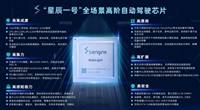PDM Digital Input, Mono
2.4 W Class-D Audio Amplifier
SSM2517
enables extremely low real-world power consumption from
digital audio sources with excellent audio performance. Using
the SSM2517, audio can be transmitted digitally to the audio
amplifier, significantly reducing the effect of noise sources such as
GSM interference or other digital signals on the transmitted audio.
The SSM2517 is capable of delivering 2.4 W of continuous output
power with <1% THD + N driving a 4 Ω load from a 5.0 V supply.
Data Sheet
FEATURES
Filterless digital Class-D amplifier
Pulse density modulation (PDM) digital input interface
2.4 W into 4 Ω load and 1.38 W into 8 Ω load at 5.0 V supply
with <1% total harmonic distortion plus noise (THD + N)
Available in 9-ball, 1.5 mm × 1.5 mm, 0.5 mm pitch WLCSP
92% efficiency into 8 Ω at full scale
Output noise: 43 μV rms at 3.6 V, A-weighted
THD + N: 0.035% at 1 kHz, 100 mW output power
PSRR: 85 dB at 217 Hz, input referred with dither input
Quiescent power consumption: 10.4 mW
(VDD = 1.8 V, PVDD = 3.6 V, 8 Ω + 33 μH load)
Pop-and-click suppression
The SSM2517 features a high efficiency, low noise modulation
scheme that requires no external LC output filters. The closed-loop,
three-level modulator design retains the benefits of an all-digital
amplifier, yet enables very good PSRR and audio performance. The
modulation continues to provide high efficiency even at low output
power and has an SNR of 96 dB. Spread-spectrum pulse density
modulation is used to provide lower EMI-radiated emissions
compared with other Class-D architectures.
Configurable with PDM pattern inputs
Short-circuit and thermal protection with autorecovery
Smart power-down when PDM stop condition
or no clock input detected
64 × fS or 128 × fS operation supporting 3 MHz and 6 MHz clocks
DC blocking high-pass filter and static input dc protection
User-selectable ultralow EMI emissions mode
Power-on reset (POR)
The SSM2517 has a four-state gain and sample frequency selection
pin that can select two different gain settings, optimized for 3.6 V
and 5 V operation. This same pin also controls the internal digital
filtering and clocking, which can be set for 64 × fS or 128 × fS input
sample rates to support both 3 MHz and 6 MHz PDM clock rates.
The SSM2517 has a micropower shutdown mode with a typical
shutdown current of 1 μA for both power supplies. Shutdown is
enabled automatically by gating input clock and data signals. A
standby mode can be entered by applying a designated PDM stop
condition sequence. The device also includes pop-and-click sup-
pression circuitry. This suppression circuitry minimizes voltage
glitches at the output when entering or leaving the low power
state, reducing audible noises on activation and deactivation.
Minimal external passive components
APPLICATIONS
Mobile handsets
GENERAL DESCRIPTION
The SSM2517 is a PDM digital input Class-D power amplifier
that offers higher performance than existing DAC plus Class-D
solutions. The SSM2517 is ideal for power sensitive applications,
such as mobile phones and portable media players, where system
noise can corrupt the small analog signal sent to the amplifier.
The SSM2517 is specified over the industrial temperature range
of −40°C to +85°C. It has built-in thermal shutdown and output
short-circuit protection. It is available in a 9-ball, 1.5 mm × 1.5 mm
wafer level chip scale package (WLCSP).
The SSM2517 combines an audio digital-to-analog converter
(DAC), a power amplifier, and a PDM digital interface on a single
chip. The integrated DAC plus analog Σ-Δ modulator architecture
FUNCTIONAL BLOCK DIAGRAM
VDD
PVDD
PGND
SSM2517
POWER-ON
RESET
CLOCKING POWER
CONTROL
PDAT
PCLK
OUT+
OUT–
Σ-∆
INPUT
INTERFACE
FILTERING/
DAC
FULL-BRIDGE
POWER STAGE
CLASS-D
MODULATOR
GAIN_FS
LRSEL
Figure 1.
Rev. B
Information furnished by Analog Devices is believed to be accurate and reliable. However, no
responsibility is assumed by Analog Devices for its use, nor for any infringements of patents or other
rights of third parties that may result from its use. Specifications subject to change without notice. No
license is granted by implication or otherwise under any patent or patent rights of Analog Devices.
Trademarks and registeredtrademarks arethe property of their respective owners.
One Technology Way, P.O. Box 9106, Norwood, MA 02062-9106, U.S.A.
Tel: 781.329.4700 www.analog.com
Fax: 781.461.3113 ©2010-2011 Analog Devices, Inc. All rights reserved.










 英伟达新AI芯片Rubin或提前半年亮相
英伟达新AI芯片Rubin或提前半年亮相

 苹果iPhone 17将全系采用三星/LG显示LTPO OLED面板
苹果iPhone 17将全系采用三星/LG显示LTPO OLED面板

 三星深化印度制造布局,供应链本地化进程加速
三星深化印度制造布局,供应链本地化进程加速

 芯擎科技“星辰一号”自动驾驶芯片点亮成功,2025年量产在即
芯擎科技“星辰一号”自动驾驶芯片点亮成功,2025年量产在即
